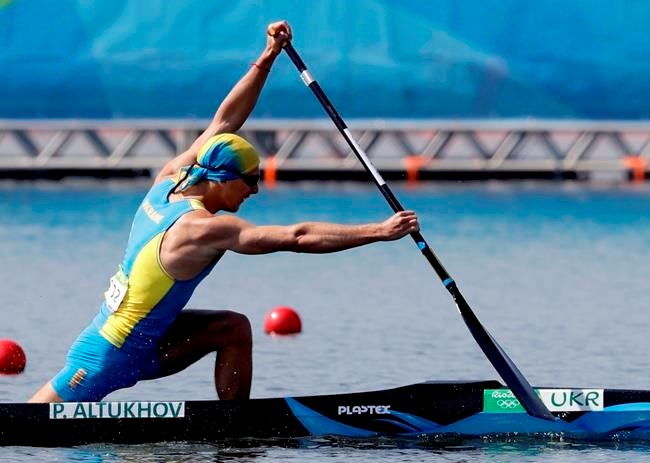DARTMOUTH, N.S. — Ukrainian paddlers at the world championships are grateful for the tranquility of the Dartmouth lakes — having temporarily left behind sirens and missiles flying overhead.
But for Pavlo Altukhov, a 26-year-old canoe racer and Olympian, the contrast of peacefulness in Canada and violence at home motivates him to push for podium performances.
"It's better to be in a safe place, but it's hard to realize that your own country is at war," he said in an interview Saturday, as athletes launched their boats for practice sessions on Lake Banook.
The world sprint and para-canoe championships begin Wednesday, with up to 40,000 spectators anticipated to attend the five days of kayak and canoe competitions.
"I need to do what I do best, for my country.... I need to paddle to raise up my country's flag in other countries of the world," said Altukhov.
"It's not a normal war. It's a war with terrorism. ... So, I ask us all the world to remember Ukraine. There's peace in your country, but there's no peace in my country."
Earlier this year, as Altukhov was driving his paddle into the waters of the Pivdennyi Buh river, which bisects the small city of Khmelnytskyi in western Ukraine, his head turned upwards as a massive sound cracked through the air.
Above, a Russian missile streaked by, headed to a destination he could only speculate upon.
"We continued paddling on the water. ... It took just seconds, and it went by," he said.
Day to day, the athlete is conscious of dozens of friends now on various war fronts, keeping in touch with them by Instagram. Even his father, 56, is now enrolled in the military.
Altukhov said at night sirens wail, interrupting the sleep he and other elite athletes require in order to rise early for morning training sessions.
"It's not easy to train when there's a war in your country," he said. "There are always sirens, there are bombs that landed near my city."
"It's strange. It's always strange because you don't know what will happen tomorrow."
Nearby, his teammate in the mixed 500-metre canoe sprint, 25-year-old Liudmyla Luzan — a silver and bronze medalist in the Tokyo Olympics — had just arrived at the lake, and was standing beside a racing canoe shipped to Canada just days before her first event.
Asked about the impact of the war on her prospects, she responded in Ukrainian, and Altukhov summarized her comments, saying: "She (Luznan) said we understand we have to be stronger and we have to continue to train, and to win everything we can win."
Andrii Opikun, the team lead for the Ukraine para-canoe athletes, worries often about his parents in Dnipro, which has been directly attacked in the Russian invasion.
"I call every day. I'm trying to help them but I have to do my job and travel to Canada," he said in a telephone interview on Saturday, adding the noon-day gun that rocks Halifax each day gives him a jolt of anxiety.
Canoe Kayak Canada partnered with the International Olympic Committee and a variety of organizations to help arrange about $250,000 in donations and support to bring and the Ukraine team to the championships and provide them housing, Canoe Kayak Canada's chief executive officer Casey Wade said in an interview Saturday.
As well, Wade said federal officials worked with Immigration Canada to provide the Ukrainians with visas that will permit longer stays in the country, and — in some instances — allow for their return to train here over the next two years if necessary.
"It's all about reaching out to athletes in need and it's a Canadian effort to support them in trying times," Wade said during a telephone interview, adding the Ukraine team is considered highly competitive in the sport.
Altukhov expressed gratitude for the support, saying that armed conflict is financially devastating for elite athletics.
"The money has to go for war. ... but our ministry of sport is always trying to save the team because we need to go to international competitions, and we need to show that Ukraine is alive and Ukraine is strong in every situation. Ukrainian sport must live."
Altukhov said after his three races here, he will return to Europe on Aug. 8, as a competition schedule continues with the European championships and other elite competitions.
He said when he's not racing, he'll return to Ukraine — whatever its circumstances — as there's a legal requirement for athletes of military age to remain in the country when they're not competing.
Later this week, it's expected that Altukhov and Luzan will be taking on the Canadian pair of Katie Vincent, an Olympic medallist, and Connor Fitzpatrick in the mixed, 500 metre canoe competition — one of the events where Canada is shooting for a podium finish.
The Ukraine duo said during the interviews that they're grateful for Canadian support, but on the water, they'll hold nothing back.
"It is heart-warming to see the Ukraine flags and feel the warmth ... but we're here to beat everybody," said Altukhov.
This report by The Canadian Press was first published Aug. 1, 2022.
Michael Tutton, The Canadian Press



